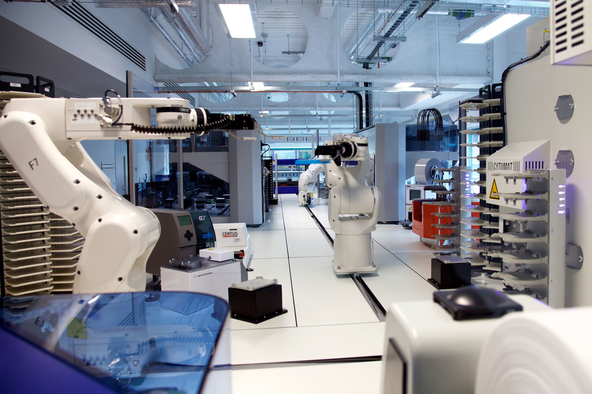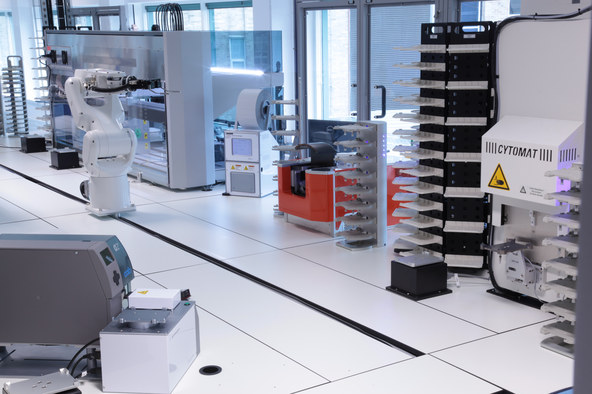event services in Edinburgh
Edinburgh Genome Foundry
Nestled at the foot of Edinburgh’s Blackford Hill lies a factory like no other. Inside robots work tirelessly around the clock with the basic building blocks of life – DNA. What they are building will revolutionise genetics research, transform medicine and create new industries.
This is not a work of science fiction but a reality that researchers have been working towards for years. The outputs of Edinburgh’s Genome Foundry ‘production line’ will not only aid understanding of how our genome works but also lead to medical breakthroughs for some of the world’s most challenging diseases.
The opening of the £5M Foundry at the University of Edinburgh in July 2016 was a major boost to the rapidly expanding field of synthetic biology and made Edinburgh a leading hub for this research globally.
Synthetic biology applies engineering principles to biology. Practitioners break down the genome into smaller parts to better understand how they contribute to how living systems work; they then either re-use or redesign these genetic parts to build new systems with a variety of novel and useful purposes.
For a long time scientists were limited as to what they could build as few tools were available. Making even small changes to genetic information was slow, painstaking work. The traditional method of designing and building DNA is a laborious, repetitive process that uses large quantities of expensive chemicals and leaves plenty of room for human error.

Edinburgh’s Genome Foundry is one of the first facilities of its kind to tackle this bottleneck. Using robots and automated processes, it can assemble large pieces of DNA from smaller parts faster, cheaper and more efficiently than humans. Scientists can now design, and have built, DNA from the ground up – mixing and matching genetic parts to see how they work. They can also build long strands of DNA that combine 1000s of genes in almost unlimited combinations.
Synthetic biology approaches are enabling new insights of how our genetics influences health and disease. Only 1% of our genome is made up of genes, the rest is largely a mystery; we know some of it is important for regulation and fine tuning how our genes work. By building DNA ‘from scratch’ we can start to understand how different parts of the genome work together.
But the real excitement around synthetic biology – and why so many investors are keen to get involved – is the ability to engineer cells for a variety of useful industrial and medical applications.
Indeed, Edinburgh is also home to the UK Centre for Mammalian Synthetic Biology. It is pioneering the development of new tools that will be game changing for those keen to apply synthetic biology for medicine and healthcare.
Ongoing projects are using the Foundry to create gene therapies to treat inherited diseases and to engineer stem cells as new treatments for Parkinson’s disease – potentially developing cures rather than simply relieving symptoms of some devastating diseases. Others are exploring how we can engineer cells to be more productive ‘factories’ for antibodies – one of the few ways to manufacture these powerful medicines used to treat cancers and inflammatory diseases.
Synthetic biology could also secure the long-term health of our planet by leading to more environmentally friendly ways of producing food, fuel, alternative materials and chemicals.

The Edinburgh Genome Foundry is one of only a handful of foundries around the world that has the capability to design, build and test DNA in this way. Edinburgh now has a growing reputation for synthetic biology – and is firmly on the global stage for its innovative research.
Little more than two years after the Foundry was launched, the robots tirelessly continue to work on ever more complex projects, building a new biology that will shape our future.
The Edinburgh Genome Foundry and the UK Centre for Mammalian Synthetic Biology are funded through the UK Research Council’s synthetic biology for growth programme and the University of Edinburgh.
For more information, please visit genomefoundry.org and synbio.ed.ac.uk.

